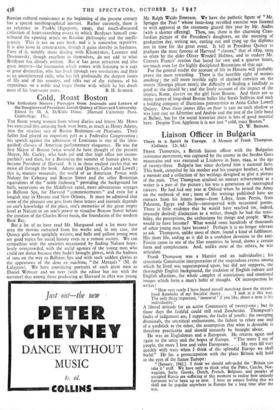Cold, Roast Boston
The Articulate Sisters : Passages from Journals and Letters of the Daughters of President Josiah Quincy of Harvard University. Edited by M. A. Dc Wolfe Howe. (Harvard University Press. Cumberlege. 15s.) THE fluent young women from whose diaries and letters Mr. Howe has extracted this amusing book were born, as much as Henry Adams, into the straitest sect of Boston Brahmins—or Pharisees. Their father had played an important part as a Federalist Congressman ; his speech against the admission of Louisiana is one of the (mis- guided) classics of American parliamentary eloquence. He was the first Mayor of Boston (what would he have thought of the present Mayor, Mr. Curley, who finds jail and that high office not incom- patible?) and then, for a Bostonian the summit of human glory, he became President of Harvard. It is in these exalted circles that we move all throUgh the book. Adams and Quincy, Cabot and Lowell - this is, mutatis mutandis, the world of an American Proust with Nahant for Cabourg and Beacon Street and the other Bostonian equivalents of the " noble faubourg " providing the background for balls, excursions on the Middlesex canal, more adventurous voyages to Ballston Spa, for Harvard " commencements " and even for a longish stay in Havana and New Orleans. It must be admitted that some of the pleasure one gets from these letters and journals depends on one's knowledge of the place, one's memories of the great empty hotel at Nahant or on one's power to visualise Beacon Street before the creation of the Charles River basin, the foundation of the modern Back Bay.
But a lot of us have read Mr. Marquand and a lot more have seen the movies extracted from his works and, in any case, the Quincy girls were sprightly writers, and balls and gallant young men are good topics for social history even in a remote society. We can sympathise with the anxieties occasioned by finding Nahant hope- lessly overcrowded, with the social agonies of the young men who could not dance because they hadn't brought gloves, with the badness of inns on the way to Ballston Spa and with such sudden glories as the appearance of the deus ex machina, " the Marquis " (M. de Lafayette). We have convincing portraits of such great men as Daniel Webster and we note (with the editor but not with the narrator) that among those graduating at Harvard in 1821 was young
Mr. Ralph Waldo Emerson. We have the pathetic figure of " Mr. Sprague the Poet " whose hour-long versified exercise was listened to with approval at the ceremony graced this year by Mr. Auden (with a shorter offering). Then, too, there is the charming Cran- fordian picture of the President's daughters, on the morning of graduation day, writing out, cutting out and tying up the diploma just in time for the great event. It fell to President Quincy to graduate the most famous of Harvard " classes," that of 1829, sung so often by the elder Oliver Wendell Holmes, and to endure Mr. Conyers Francis' oration that lasted for two and a quarter hours, too much even for the highly disciplined Bostonians of that age.
For the general reader the account of life in Havana will probably prove the most rewarding. There is the horrible sight of women smoking ; the still more terrible sight of chained convicts on the streets (Georgia please note); the difficulty of finding a landlady as good as she should be ; and the lively account of the impact of the tropics, Rome, slavery on the girl from Boston. And there are so many names of long-dead Boston belles like Sarah Sullivan and such a holding company of illustrious patronymics as Anna Cabot Lowell Quincy. Over these jeunes flues en fleur is cast no such shadow as was later cast on Albertine and Andre and the rest of the little band at Balbec, but for the social historian there is lots of good material here. Despite Tom Appleton it is not just " cold, roast Boston." D. W. BROGAN.


































 Previous page
Previous page